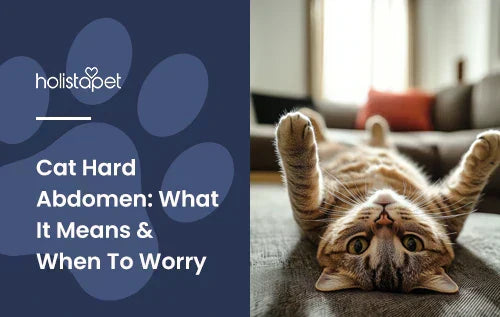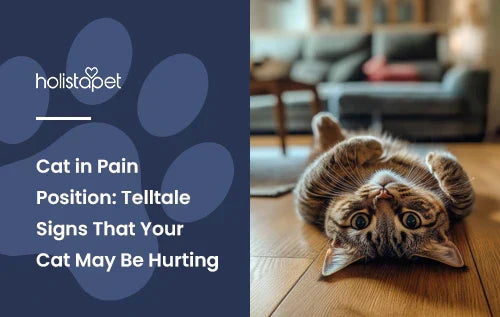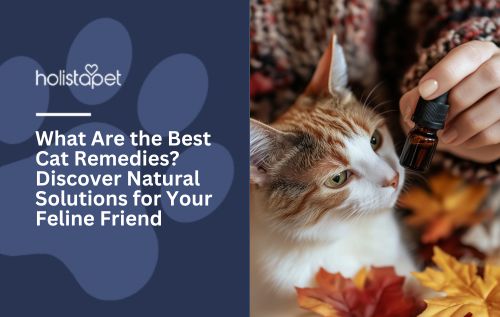There's nothing soft or squishy about this situation. Your cat's hard abdomen just popped up out of nowhere, and now they're looking tense and rounder than usual. That firm tummy deserves your attention. Knowing what it might mean is the first step to helping your kitty feel better fast.
What Does a Hard Abdomen in Cats Mean?

A hard abdomen usually signals something happening inside the stomach. It could be swelling, pressure, or fluid buildup. The belly may feel tense and rounded instead of soft and relaxed. That firmness can develop fast or gradually, depending on the underlying cause.
Why Is My Cat's Stomach Hard?
Digestive gas, constipation, and bloating from dietary changes are often to blame. In some cases, the issue is due to a buildup of excess fluid or some swelling linked to an underlying disease. More serious causes include organ enlargement, intestinal blockage, and abdominal mass growth. Lastly, a pregnant cat's belly may also feel firm to the touch. Here is some more information on these issues.
Gas and Digestive Discomfort
Gas builds up when food doesn't move well through the gastrointestinal tract. Dietary changes, food-related sensitivity, and swallowing air during eating can all lead to bloating and discomfort. Some felines may show no signs beyond a firm abdomen, while others may act restless and avoid food.
Constipation or Fecal Blockage
If your cat hasn't pooped in a day or two, constipation could be the reason. Issues like low fiber, dehydration, and blocked intestines can slow everything down. This can then make the abdomen feel firm, swollen, and tender. In some cases, it's a full blockage that may involve surgery.
Intestinal Parasites or Worms
Intestinal worms and parasites can cause gas, bloating, and irritation, which can make the abdomen feel firm. You might also notice weight loss, a dull coat, and sudden scooting behavior. Roundworms are the most common culprits, but others like hookworms and tapeworms can cause problems, too. Deworming is one simple solution.
Pregnancy in Unspayed Female Cats
A pregnant cat may develop a noticeably firm and rounded belly. This usually happens in the later weeks as the kittens grow and take up more space. Other signs include weight gain, increased appetite, and nesting behaviors. A hard stomach during pregnancy isn't always a concern, but regular checkups are still important to rule out complications.
Fluid Retention or Bloating (Ascites)
Too much fluid in the abdomen, known as ascites, can make your cat's belly feel tight and heavy. This fluid retention can point to issues like heart disease, liver disease, and feline infectious peritonitis (FIP). The buildup often causes abdominal distention and can lead to pressing on nearby organs. You might also notice trouble breathing and changes in posture.
Intestinal Obstruction or Foreign Object
Swallowed objects like strings, toys, and hair ties can block the intestinal tract and cause a hard, distended abdomen. The belly might feel tight, and your cat may vomit, avoid food, and hide. Blockages reduce movement in the gut and create pressure, leading to fluid buildup and swelling in the abdominal cavity. An obstruction often requires surgical removal, especially if symptoms appear suddenly.
Enlarged Organs (Liver, Spleen, or Kidneys)
Organ enlargement can cause the belly to feel firm and uneven. This growth may stem from issues like liver disease, kidney problems, and other shifts in organ function. The swelling adds pressure and can stretch the abdominal wall. This is something a vet can detect during a physical examination. If the abdomen feels hard and other symptoms show up, further testing may be necessary to find the root cause.
Abdominal Masses or Tumors
A cat's swollen belly can also point to an abdominal mass. Whether benign or malignant, such growths can press against the internal organs. Not all tumors cause visible swelling, but they often change how the belly feels. Also, a hard abdomen without obvious discomfort can still mean something is growing inside. An abdominal ultrasound or X-ray can help spot the mass and guide appropriate treatment.
Internal Bleeding or Trauma
A sudden hard belly can signal internal bleeding after a traumatic injury. Blood or swelling in the abdominal cavity causes tension and pressure, and the area may feel tight, warm, and sensitive to touch. Cats often hide after injuries, so watch closely for behavioral changes. Fast care can help prevent life-threatening problems.
Feline Infectious Peritonitis (FIP)
FIP is a viral disease that affects the immune system and often shows up with a round, bloated belly that feels tight. Wet FIP is the form that causes abdominal fluid to collect. Affected cats may also exhibit weight loss, tiredness, and breathing difficulties. FIP can be life-threatening, so any sudden belly changes should get checked by a vet.
Female Cat Hard Stomach: What To Know
Pregnancy is a common cause, especially in unspayed cats showing weight gain and abdominal firmness. But that's not the only reason. Heat cycles and uterine infections like pyometra can also be the culprit. These conditions may lead to a swollen belly, fluid accumulation, or other symptoms that need fast, supportive care.
Cat Hard Stomach With No Pain — Is It Still Serious?
Yes, a hard stomach without pain can still point to something off with your cat's health. Felines typically hide discomfort well, so just because your pet isn't crying or flinching doesn't mean all is fine. Conditions like organ enlargement, abdominal masses, and intestinal parasites can cause a firm belly without clear signs of distress. If the firmness sticks around, get a vet involved.
When Is a Hard Belly in Cats an Emergency?
A firm, swollen belly can turn serious fast, especially if other symptoms tag along. These signs may point to an emergency that needs immediate attention:
- Vomiting or Diarrhea
- Lethargy, Collapse, or Unresponsiveness
- Hiding, Avoidance, or Sudden Behavioral Changes
- Shallow, Rapid, or Labored Breathing
- Crying, Vocalizing, or Signs of Pain When Touched
- Straining in the Litter Box or Signs of Constipation
- Swollen, Distended Abdomen or Visible Bloating
- Loss of Appetite or Refusal To Eat
- Pale Gums or Signs of Poor Circulation
- Fever or Body Temperature Changes
- Restlessness, Pacing, or Inability To Get Comfortable
- Signs of Trauma, Such as Limping or Bleeding
Cat Breeds That May Be More Prone to GI Sensitivities
Siamese, Sphynx, and Devon Rex cats often show signs of food sensitivity and gastrointestinal tract issues. These breeds may develop abdominal swelling and frequent digestive upset. Longhaired kitties, like Persians and Maine Coons, may struggle with hairballs and slow digestion. Genetics can also affect how the intestinal tract functions, making some felines more likely to show firm bellies.
How to Gently Check Your Cat's Abdomen at Home
Checking your cat's belly can help you catch problems early. Use gentle pressure with your fingers while your pet is calm and relaxed. Feel for swelling, tightness, or any unusual firmness along the belly.
- What To Feel For. A normal belly should feel soft and pliable.
- How To Tell if Your Cat Is Uncomfortable. Watch for flinching, growling, and trying to escape your touch.
Diagnosing a Hard Abdomen: What Vets Look For
Vets use hands-on checks and tools to figure out what's wrong. They look for signs of swelling, fluid in the abdomen, and organ enlargement during the exam.
- Physical Exams & Palpation. The vet gently presses the belly to check for tension, masses, and tenderness.
- Imaging: Ultrasound or X-Rays. These scans can show abdominal organs, fluid buildup, and foreign objects.
- Bloodwork and Stool Testing. Complete blood count, stool exams, and specialized blood tests help rule out infection, parasites, and other hidden problems.
Holistic and Natural Support for Digestive Wellness

Natural support can help manage bloating, upset bellies, and mild digestive issues. Here's what may help:
- Probiotics. Add friendly bacteria to balance your cat's gut.
- Digestive Enzymes. Help break down food and ease belly discomfort.
- Pumpkin. Plain or canned. High in fiber and moisture to support regular stool.
- Slippery Elm Bark. Soothes the stomach lining.
- CBD for Cats. May support digestion and ease anxious behaviors linked to gut tension. Check out HolistaPet's CBD collection for cats for vet-approved, lab-tested options.
- Prebiotics. Feed the good bacteria in your cat's gut. For example, inulin.
- Chamomile or Fennel Tea. Vet-approved options can help relax the tummy.
- Hydration Boosters. Things like bone broth can encourage fluid intake.
- High-Quality, Limited-Ingredient Diets. Keep common triggers at bay.
- Hairball Relief Pastes or Fiber Additives. Help prevent blockages.
Can Stress or Anxiety Cause a Hard Tummy in Cats?
Yes, stress can trigger real physical changes in your cat's belly. Call it the mind-gut connection. Nervous felines may tense their abdominal muscles and experience slower digestion. This can lead to a firm stomach that feels like something more serious.
Calming support, like HolistaPet's CBD for cats, may help ease those anxious behaviors and promote more relaxed digestion. Take your pick from our range of chews, treats, oils, and capsules.
Tips To Support Healthy Digestion at Home
Keeping your cat's digestion on track can help prevent that dreaded hard abdomen. Try these simple steps:
- Hydration & Diet Changes. Offer more wet food or bone broth to keep things moving. Avoid sudden dietary shifts.
- Preventing Hairballs & Obstructions. Brush regularly and use hairball pastes or fiber to avoid blockages.
- Gentle Supplements To Support GI Tract. Try probiotics, pumpkin, or vet-approved enzymes to promote smooth digestion.
FAQ – People Also Ask About Cats With Hard Abdomens
In the next few sections, we'll go through common questions cat parents ask when their kitty's belly feels tight or just not right. Keep reading to get answers that truly help.
Why is my cat's stomach suddenly hard and round?
A sudden hard, round belly can mean fluid accumulation, intestinal parasites, or intestinal tract blockage. It might also point to pregnancy or your cat's diet. If the belly feels tight and your cat seems off, it's time for a vet check.
What should I do if my female cat has a hard stomach?
Start by checking for other signs. Weight gain, nesting behavior, and a swollen belly may point to pregnancy. But if your pet shows no signs of being pregnant, a hard abdomen could mean something else. Female cats can develop issues tied to reproductive health, especially if they're not spayed.
Can a cat's stomach be hard without causing pain?
Yes, many cats with a firm belly don't show obvious signs of discomfort. They may still eat, play, or act normally even with abdominal enlargement. Don't wait for your pet to cry or limp. Belly tension without distress still deserves a vet's attention.
Is it safe to give my cat anything at home for tummy tension?
Some gentle options may help, but always check with a vet first. For a tight belly from food sensitivity or stress, natural remedies like pumpkin and probiotics can support digestion. CBD for cats may also help ease anxious behaviors that lead to belly tension. Still, skip the guesswork and call the vet first.
How do I know if my cat is bloated or constipated?
Bloating usually comes with a swollen abdomen, gas, and mild discomfort. Your cat might seem puffed up or restless. Constipation often shows up as straining in the litter box or no poop at all for a day or more.
Final Thoughts on Monitoring a Cat's Hard Abdomen
A cat's firm belly can mean many things—some minor, some serious. Keep an eye on tummy changes, eating habits, and behavior. If something feels off, don't wait too long to get help.
If you're looking to support your feline friend's mood and digestion naturally, HolistaPet's CBD collection for cats may be a gentle solution. Always trust your instincts and act quickly to keep your cherished companion happy and comfy.







![Probiotics For Dogs [Soft Chews] - HolistaPet](http://www.holistapet.com/cdn/shop/files/Probiotic-Infographic-1_472d7a29-e30c-435a-9638-1365d8c3a9f9.jpg?v=1725384841&width=104)
















 CBD Oil for Cats - Fast Acting
CBD Oil for Cats - Fast Acting
 CBD Cat Treats - Easy Dose
CBD Cat Treats - Easy Dose
 CBD Calming Chews for Cats - Highly Rated
CBD Calming Chews for Cats - Highly Rated
 CBG Oil for Dogs and Cats - Loved by Thousands
CBG Oil for Dogs and Cats - Loved by Thousands





Leave a comment
All comments are moderated before being published.
This site is protected by hCaptcha and the hCaptcha Privacy Policy and Terms of Service apply.